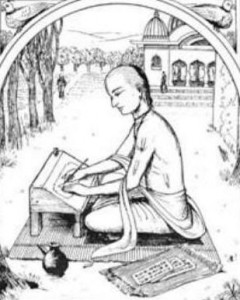Srila Prabhupada and Syamasundara das discusses various philosophers teachings-This one is about David Hume and Immanuel Kant. Prabhupada explains the Krsna Conscious philosophy against these two men’s ideas, which we can see , some of which still permeate todays atheistic and impersonalistic society. These types of people just cannot and will not accept that their may be a Supreme Person causing everything to happen.
Śyāmasundara: This is just what he is saying, that whenever you try to speculate about the Absolute you will run into contradictions.
Prabhupāda: Yes. So contradiction mean imperfect knowledge. Perfect knowledge means who sticks to his principles. That is perfect knowledge. One who does not stick to his original proposal, his knowledge is imperfect.
Śyāmasundara: He says that by trying to apply their reason to the transcendental, that they naturally will run into trouble, that there will be contradictions in their thought. By trying to apply these empirical categories to the transcendental, naturally there will be these contradictions. They will not be able to discover the real nature of things because there is always some contradiction by using the reason.
Prabhupāda: Without fixed up conclusion, there is contradiction. Our fixed-up conclusion is that Kṛṣṇa is the cause of all causes. How, one after another, the categories are developed, that is in the Vedic literature. But it is summarized that Kṛṣṇa desired or He put His glance over the material nature and the material nature became impregnated, and then He delivered so many things. Matter and spirit have combined together, and the whole cosmic manifestation has come into being.
Śyāmasundara: To go back to this idea of cause and effect, Kant says that just as time and space are a priori concepts or mental creations—in other words, before we have any sense experience, we still have an idea of time and space—just as this is so, so also cause and effect is a priori category of human understanding.
Prabhupāda: So that a priori existence is there, time and space.
Śyāmasundara: Time and space, and cause and effect.
Prabhupāda: I take my birth and at a certain time time. So time was existing before my birth, and after my death time will continue to exist. Similarly, space. But, temporarily, I take some time. That is the duration of my life. Or I am occupying some space. This is temporary. Time and space are eternally there. At least time is eternally there, because space is also born in time.
Śyāmasundara: How is that?
Prabhupāda: That we get from Bhāgavata. Because this material space is also ākāśa, it is born of the finer subtle mind and intelligence. In the Bhāgavata the description is there. Space is also the creation.
Śyāmasundara: So this Hume has said that cause and effect are habitual assumptions, that we can naturally assume that a certain effect follows a certain cause. But it is not necessary that the cause makes the effect.
Prabhupāda: No. We disagree with that. Without cause there cannot be any effect. Let him prove that this is…, there is an existence without any cause. Then he can say like that.
Śyāmasundara: Hume’s example is if we find a footprint on the beach, normally we can assume that a human being left it…
Prabhupāda: That is a fact. Why normally? That is factually.
Śyāmasundara: Still, it remains a probability.
Prabhupāda: Why probability?
Śyāmasundara: It is possible that something else left the footprint.
Prabhupāda: How is it possible?
Śyāmasundara: There could have been a cast made of another foot, and someone else could have made it. Other possibilities could exist.
Prabhupāda: That is nonsensical. Someone will come and make a footprint to mislead you! That is also caused. (laughter) So it is a foolish idea. That is also caused—someone came; there is cause.
Śyāmasundara: This is just what Kant is saying. He says, no, still we are born with an idea of cause and effect. This is a priori…
Prabhupāda: No. This is fact: cause and effect is always there.
Śyāmasundara: He says that intuitively, when we see something, we understand what is cause and what is effect.
Prabhupāda: You cannot understand what is the cause, but there must be cause. There must be cause. Without cause, nothing can happen. That is his imperfect knowledge, that something may happen without cause. No. That does not happen.
Śyāmasundara: For example, the idea of the bird flying on the limb and the fruit. Either the bird caused the fruit to fall, or it fell, but the cause is still there.
Prabhupāda: Yes. Either you accept this cause or that cause, that is a different thing, but cause must be there. So this example is given that they are fighting unnecessarily to find out the cause. But cause is there. Just like some foolish person enquired when the living entity became fallen. What is the use of this question? Simply take it is fallen.
Śyāmasundara: There is a cause.
Prabhupāda: There is a cause. Now, you may not find out the cause, just like here is a diseased man, and there is some cause. So instead of finding out the cause, you go on treating the disease. Get it cured. But cause must be there. Otherwise he is infected, why others are not infected? The cause must be there.
Śyāmasundara: So he says that the laws of physics are not inherent in nature, but they are modes of thought.
Prabhupāda: No. This is also nonsense. There is a law. All physical things which are going on, there is a law. Just like while the temperature is below zero, the water becomes solid. That is a physical law.
Śyāmasundara: Yes. That happens when it is below zero, but our understanding of that phenomenon, that law of physics, is only because of our thought process. Our thought process analyzes it.
Prabhupāda: Analysis is also thought process, but you cannot think that when the water becomes solid, at a certain temperature, you cannot think that it is liquid. This is factual. (indistinct) Here is a medical man; there is disease. We may not find out, but he knows it must have been caused.
Śyāmasundara: What he is saying is that so that water may freeze, physical nature goes through changes,but it only becomes a law in our minds, when we begin to think about it.
Prabhupāda: Why in your mind? That is the law. When the temperature is reduced to a certain point, the water becomes frozen and becomes solid. That is the law. How can you say without law?
Śyāmasundara: But the concept of law is a mode of thought.
Prabhupāda: Well, that is imperfect human society. But nature’s law, God’s law, is not like that. Nature’s law: just like fire burns; it burns everywhere. It is fact, perpetually. It is not that in certain cases it burns and in certain cases it does not. It burns. Even a child touches the fire, it will burn. No consideration. Just like in human law, a child steals and an adult steals. Court excuses, “He is a child. Let him be.” But nature’s law is not like that. The fire, whether adult touches or a child touches, it must burn. That is nature’s law.
Śyāmasundara: When we conceive of “fire burns,” we are shaping an interpretation of the phenomenon. We have experienced it, so we shape an interpretation, and that becomes a law in our minds.
Prabhupāda: What is that law in the mind, you may think or may not think, the law will act. (laughter) Simply speculation. It has no meaning. It is called jugglery of words, that’s all. To some foolish men, he is accepted as a great philosopher, but it is simply jugglery of words, that’s all.



